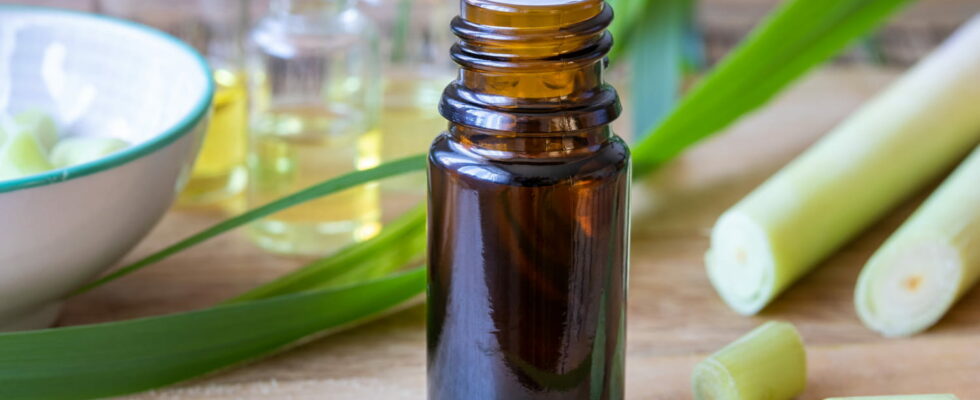The essential oil of Lavender Aspic or Fine Lavender in particular are effective against itching.
The mosquitoes are back, so it’s time to equip yourself with the essential oils you need soothe their bites. “The healing formula simpler is to combine with the HE of Lavender Aspic or Fine Lavender and the essential oil of Ceylon Citronella diluted in a Calendula oil, vegetable oil which also has a calming action” recommends Dr. Patrick Aubé. The correct dosage: 80 drops of Lavender Aspic, 80 drops of Ceylon Citronella EO, to be diluted in 30ml of Calendula oil. “Apply to mosquito bites three or four times a day” advises this specialist.
You can use a few drops of Lavender Aspic essential oil when you have mosquito bites. “Its active components, camphor and linalool, have a anti-inflammatory and analgesic effect” explains Dr. Patrick Aubé, general practitioner, expert in phytotherapy and founding member of the National Syndicate of Phyto-Aromatherapy. “The essential oil of Lavender Aspic is the most interesting to relieve a mosquito bite because it is the easiest to use“ he specifies. This oil does not pose a problem of skin tolerance (it is not allergenic) and it can be used pure unlike other essential oils which must be diluted. Note: Fine Lavender EO is also suitable but it is less rich in camphor so it is a little less analgesic.
Another essential oil that can be used after a mosquito bite: tea tree essential oil. “It has a local antiseptic side which pskin lesions caused by scratching mosquito bites return. It also has a healing effect.” informs Dr. Patrick Aubé. Namely: Tea Tree HE has a mosquito repellent action when diffused. “However, as its smell is not very pleasant, we prefer the essential oil of Ceylon Citronella or Bourbon Geranium” indicates the doctor. Be careful, this essential oil must always be diluted before use and not be used in children.
Peppermint essential oil is an essential oil to have in your family medicine cabinet in the summer. It has a calming effect and relieves itching. “The menthol it contains has a refreshing and local anesthetic action” informs the doctor. So, if you can’t help but scratch, this is the oil to use. This EO must be diluted before use and, as with Tea Tree essential oil, should not be used on children under 7 years old.
There Ceylon lemongrass is one of the essential oils that are anti-mosquito. In addition to its repellent action in diffusion and on the skinit can also soothe pain and itching thanks to its anti-inflammatory action. Dilute 1 drop of this EO in 5 drops of apricot kernel HV (vegetable oil) and apply on the bitten area, 3 to 5 times every hour for 2 hours, then 3 times a day for 2 days. For children not before 6 years old or without the advice of a qualified health professional. Not recommended for pregnant or breastfeeding women.
If you have an allergic terrain, test essential oils on a very small area of skin. “Choose Lavender Aspic essential oil, which is not allergenic. recommends Dr. Patrick Aubé. If you react strongly to mosquito bites, know that it is not a real allergy (you are not at risk of anaphylactic shock) but a local allergic reaction “There are inflammatory reactions (redness, heat, etc.) that are more or less strong depending on the person’s histamine terrain” explains Dr. Aubé.
Aromatherapist Françoise Couic-Marinier recommends the following formula for children from 6 years old : “Massage the sting with a mixture of 1 drop of lemon eucalyptus EO, 1 drop of spike lavender EO, 6 drops of calendula or calophyllum HV (vegetable oil). To apply every 5 minutes if necessary, 2 to 4 times a day (normally one day is enough)“. This formula is adaptable to children”from 3 years old if replaced with officinal lavender”.
Essential oils are contraindicated for pregnant and breastfeeding women as well as for children under 7 years old as well as for people who are allergic to it. ““We must respect the doses” recommends Dr. Patrick Aubé, who also warns against oxidized essential oils. “When the active components oxidize in contact with air, they lose their qualities and become toxic” he explains. Also, do not use a bottle of essential oil that has been open for several years. Finally, “Essential oils all have a photosensitizing effect, it is best to avoid exposing yourself to direct sunlight after use.” advises the doctor.
Thanks to Dr. Patrick Aubé, general practitioner, expert in herbal medicine and founding member of the National Syndicate of Phyto-Aromatherapy. Author with Caroline Gayet of the book Les tisanes qui soignez, les simples santé, Editions Leduc.s 2020
